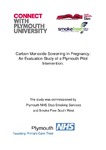Carbon Monoxide Screening in Pregnancy: An Evaluation Study of a Plymouth Pilot Intervention
| dc.contributor.author | Stenhouse, EA | |
| dc.contributor.author | Letherby, G | |
| dc.contributor.author | Corrigan, O | |
| dc.contributor.author | Adams, L | |
| dc.contributor.author | Bendall, Alison | |
| dc.contributor.other | Plymouth NHS Stop Smoking Services and Smoke Free South West | |
| dc.date.accessioned | 2014-08-27T13:58:23Z | |
| dc.date.available | 2014-08-27T13:58:23Z | |
| dc.date.issued | 2014-08 | |
| dc.identifier.isbn | 978-1-84102-367-0 | |
| dc.identifier.uri | http://hdl.handle.net/10026.1/3090 | |
| dc.description.abstract |
This report provides an analysis and evaluation of a National Institute for Health and Care Excellence (NICE) recommended pilot intervention which was designed to identify pregnant women exposed to carbon monoxide due to cigarette smoke and refers them to local stop smoking services (LSSS). The pilot intervention was carried out by community midwives working in two areas of Plymouth. The city has areas of social and health inequalities and the study drew on populations from a socially deprived neighbourhood and a socially affluent area. The pilot was instigated following new NICE guidance recommending that all women attending initial ante natal booking appointments with their community midwives be offered a Carbon Monoxide (CO) breath analyser screening to determine their smoking status and or exposure to other forms of CO. This evaluation study identifies the benefits and barriers associated with the implementation of the CO screening pilot. In particular, our aims were to explore any detrimental impact on the relationship between women and their community midwives, identify the impact on midwives in terms of time and resources, reveal the responses and acceptability or otherwise of the screening as perceived and experienced by the women being asked to participate during the booking appointment and finally to evaluate the success of the intervention overall in relation to the numbers of referrals made to Plymouth’s LSSS. A further aim was explore any differences in the two socio demographic areas. We adopted a mixed methods approach involving four focus group interviews with 23 midwives, a survey posted to the 258 women who attended initial antenatal booking appointments in the study areas, an online version of the survey to ascertain the views and experiences of pregnant women and new mothers nationally and an interrogation of an internet forum discussion board for mothers. A two page questionnaire consisting of 12 questions was designed and posted to women who attended the booking appointment with the midwife during the three month pilot period and the same survey was made available online. Questions were designed to elicit women’s views about the information given by the midwife in relation to the screening, whether they had agreed to participate in the CO screening process, their experiences and views about offering CO screening to pregnant women and their smoking status and those of other household members. Of the 258 questionnaires posted to women who had attended the clinic during the pilot intervention 40 completed responses were returned representing a 15.5% response rate. Only 4 responses were received from the online survey posting but an additional 484 comments posted on the Mumsnet website discussion board were analysed. Our findings show that in general there was a high degree of acceptability for the intervention. Midwives and their clients were generally in support of the screening being offered to all pregnant women. However, this support was dependent on a number of contextual factors. Women wanted to be properly informed about the screening and midwives wanted to be kept informed about the effects of the intervention on women’s smoking cessation. Initial and ongoing training of midwives in utilising the protocol and in instructing women to correct use the monitor was also very important. Trust was revealed to be a very important aspect of the relationship between women and their midwives. Some women felt that the CO screening was being used just to check whether or not they were smokers and some midwives also worried about the possible negative effects the CO screening may have on their relationships with women. | |
| dc.format.extent | 1-45 | |
| dc.language.iso | en | |
| dc.relation.ispartof | Carbon Monoxide Screening in Pregnancy: An Evaluation Study of a Plymouth Pilot Intervention | |
| dc.title | Carbon Monoxide Screening in Pregnancy: An Evaluation Study of a Plymouth Pilot Intervention | |
| dc.type | report | |
| plymouth.confidential | false | |
| plymouth.publisher-url | http://pearl.plymouth.ac.uk/ | |
| plymouth.publication-status | Published | |
| plymouth.organisational-group | /Plymouth | |
| plymouth.organisational-group | /Plymouth/Admin Group - R&I | |
| plymouth.organisational-group | /Plymouth/Faculty of Arts, Humanities and Business | |
| plymouth.organisational-group | /Plymouth/PS - Research & Innovation | |
| plymouth.organisational-group | /Plymouth/REF 2021 Researchers by UoA | |
| plymouth.organisational-group | /Plymouth/REF 2021 Researchers by UoA/UoA03 Allied Health Professions, Dentistry, Nursing and Pharmacy | |
| plymouth.organisational-group | /Plymouth/Research Groups | |
| plymouth.organisational-group | /Plymouth/Research Groups/Institute of Health and Community | |
| plymouth.organisational-group | /Plymouth/Users by role | |
| dc.publisher.place | Plymouth Electronic Archive and Research Library | |
| dc.rights.embargoperiod | Not known | |
| rioxxterms.licenseref.uri | http://www.rioxx.net/licenses/all-rights-reserved | |
| rioxxterms.type | Technical Report |


